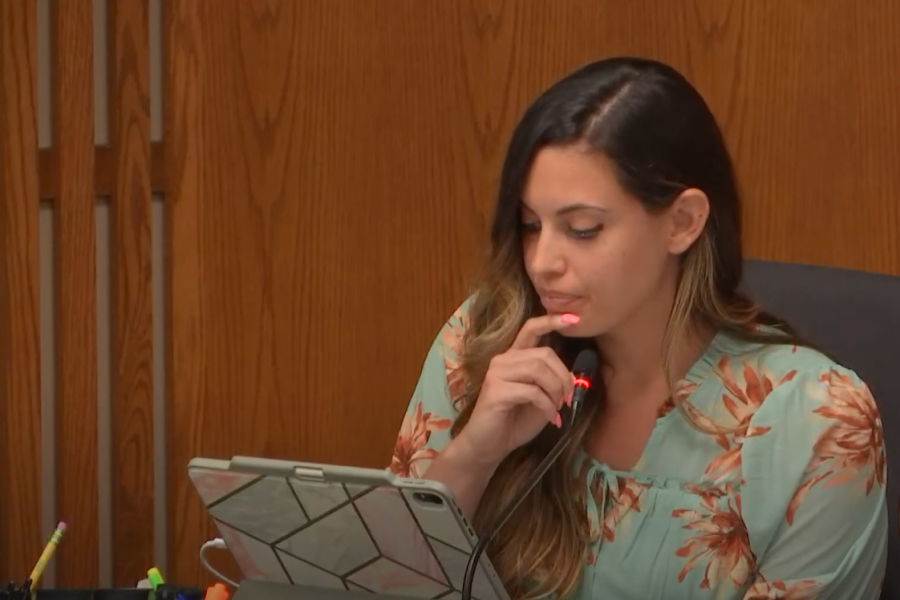EDITORIAL: NEW CCSD SCHOOL BOARD LEGISLATION EXCEEDS EXPECTATIONS
The district seeks to address pressing problems in the community with new policies
November 7, 2022
As discussions about fracturing the grossly overpopulated CCSD have continued, it is understandable why district residents are anxious about Nevada’s upcoming bi-yearly legislative session. Many community members are doubtful about whether new legislation is still a viable option to uplift the school system, as opposed to a restructuring of the district. A primary factor contributing to the loss of faith in Clark County’s educational department was the poor handling of an increasingly dire COVID-19 crisis just a few years ago which rose to unmanageable levels in Nevada during March 2020. Though skepticism in district policies has continued into the years following this political blunder, CCSD seems to be heading in the right direction with the new issues they intend to confront.
Scheduled to reconvene on Monday, Feb. 6, the district has already released bill draft requests that are designed to address the most pertinent issues of the education system in Clark County. These specific bills are designed to address three main problem areas: improving working conditions for teachers and licensed instructors, general health issues including school safety and student mental health, and board management issues which may include a potential restructuring of the board itself.
OPT OUT SEX ED:
A primary issue in our district is a vote on an opt-in versus opt-out policy regarding sex education for middle and high schoolers. Nevada currently has an opt-in policy regarding sex education; this means that in order to teach the sex-ed curriculum, parents have to give explicit permission to the school district in the form of a signed content waiver. In states with opt-out policies, sex education is automatically included in the regular school curriculum unless the legal guardian of a student specifically requests their child to be excluded from the standardized sex-ed cirriculum.
Thirty-six states currently have explicit opt-out policies in their school districts, with only four (Nevada, Utah, North Carolina, and Mississippi) still supporting opt-in policies. A simple policy change could better serve the health of students in the state of Nevada. An opt-out policy in our state would not inhibit the right for parents to control the education of their children: of course, concerned parents would always have the ability to check the “NO” box on an opt-out form. But for the 7.57% of students who didn’t even return their slips, the benefit could be immeasurable.
Despite overwhelming support for this bill, district B board member Katie Williams remains the sole objector to the bill, claiming that the district ought to remain neutral on the issue. However, we believe this position reflects a flawed view of the duties CCSD has to its students. There’s no reason the district should not take a firm position in this matter; it is the moral obligation of the district to protect student health and safety where necessary, and the legal obligation of the district to enact legislation that facilitates this process. If it can be plausibility inferred that expanding access to sex-ed for students would work in some capacity to reduce the 16.8 births per 1,000 teens in Nevada, its only common sense to vote in favor.
A common position of concerned citizens on the issue is that switching to an opt-out policy and defaulting to the sex-ed curriculum without the consent of parents may accidentally expose children who did not expressly opt-in to sensitive material. While this is definitely a possibility, it’s an acceptable risk. Parents who want to protect their children from certain materials have an obligation to be heavily involved in their children’s education; if a guardian is negligent enough to where they fail to sign a simple opt-out form for their child, they have no reasonable basis to claim wrongdoing on behalf of the school district. An opt-out policy streamlines the education process for the vast majority of district students, and does not trample on the rights of parents in the manner some groups have claimed.
IMPROVING EDUCATOR EMPLOYMENT:
In underfunded public schools that already have student populations which exceed building capacity, class sizes must increase even further because of a shortage of teachers. Teachers can have classes between 40-50 students, and sometimes even more, for the core classes that all high school students have to take to graduate. Employee shortages in teaching positions have become increasingly pronounced in the daily lives of students who have to face decreases in the quality of their education due to overcrowded classrooms. Thankfully, this problem has been acknowledged by the district.
The first motion of the bill proposed a general wage increase for educators in the public school system. This salary increase follows a previous salary raise announced by the district in May which approved a bill for a $7,000 increase in the starting salary of new teachers and a $5,000 bonus for existing teachers, that went into effect in August.
Of course, a financial incentive would increase the interested number of applicants for any general position in the workforce. However, this change is especially important to educators who may be more likely to remain in their fields of work because of the increased financial security. Though investing in teachers would be an acceptable tax burden on the public, few details have been released about how the district will actually raise this money in practice.
Another long-overdue change being proposed to address the teacher shortage in Nevada is changing teacher license reciprocity and waiving application fees for new teachers applying for licensing. These are issues that should have been addressed way before the teacher shortage occurred, but have now become an increasingly apparent barrier for new hires in the district.
With an increase in Nevada’s resident population from 2010-2020 of about 400,000 people, it’s obvious that changes in teacher licensure need to accommodate the flow of students. While students moving into the state can flow freely into, and further congest the public school system, teachers continue to face the re-licensing barriers specific to Nevada that prevents immediate employment and may even incentivize career changes, especially for younger teachers moving here. After all, why would you wait multiple months to be recertified into a generally low paying career path when better jobs are available?
We believe license reciprocity policies are the best available solution to increase the number of available teachers in the district, and every resident that is feeling the fallout of decreased teacher employment post-COVID ought to support this change. While concerns of teacher quality may be legitimate, it’s doubtful that teachers from other states would undermine public education in Nevada, which already ranks around 48th to 50th in the country on a state-by-state basis.
The second part of the proposal waiving new application fees is a positive change not necessarily because of the monetary implications, but mostly in principle. While it’s doubtful that individuals pursuing careers as teachers will be stopped by an application fee, waving the $180.00 charge for new license applicants is a small quality-of-life change that works to create rapport between CCSD and the educators it employs. This bill reduces neither the quality nor competency of teachers while also making the application process itself less intimidating. First impressions are crucial, so CCSD ought to build employee relationships by welcoming teachers in the most agreeable way possible.
BOARD RESTRUCTURING:
After canceled board meetings, failed voting sessions, and complaints from the community to account for their concerns, it took nearly a year for news of COVID reopening plans to even be publicly announced. Following an additional scandal with CCSD Superintendent Jesus Jara being fired, then later rehired after suing the board, additional calls for accountability in the school district have risen to the surface.
Lt. Gov. Lisa Cano Burkhead submitted a bill draft request nearly two weeks ago calling for measures to restructure the school board and governing bodies which supervise CCSD. Most notably, her plan includes adding new representatives to the board from distinct regions of the Las Vegas Metropolitan area such as Henderson, North Las Vegas, and the city of Las Vegas. For incorporated cities which have more than 75,000 residents, an additional non-elected trustee would also be appointed to the board by a governing authority in the region.
The primary goal of this proposed legislation is to “modernize and professionalize” the Board of Trustees in Nevada while maintaining a more accurate level of democratic representation.
Adding more trustees achieves both goals: not only more legitimately to represent the interests of the general population more accurately, but it would also serve the interests of the district itself to have appointed board members, as they would introduce a level of experience that isn’t common among the politically inexperienced representatives that have been previously elected.
In fact, to run for a position as a board trustee in the district there is no requirement for previous government or educational experience: current board members Danielle Ford and Katie Williams have no educational or political background prior to their positions as board members. Appointed trustees would most likely reflect the interests of other locally elected officials such as governors, also giving those uninterested in education-specific issues a way to indirectly participate in the system.
We believe a restructuring of the school board system has been long overdue, and the greater degree of democratic participation would serve to create greater legislative balances to avoid situations similar to Jesus Jara’s recent lawsuit against the school board. Regardless of which party was actually responsible for this incident, the school board ought to hold itself to a higher standard of conduct to avoid similar controversy. Appointed representatives to the board who actively participate in local, mainstream political positions will be better suited to address issues of corruption that the community leaders who serve on the board do not know how to handle.
In sum, the proposed restructuring of the board is a welcome change that, while not perfect, serves in a higher capacity than our current system to represent the interests of the parents, students, and educators. If approved, this bill may act as a surprising change in pace for the district and could work to change the dynamic between community voices and serving members in a positive way.









